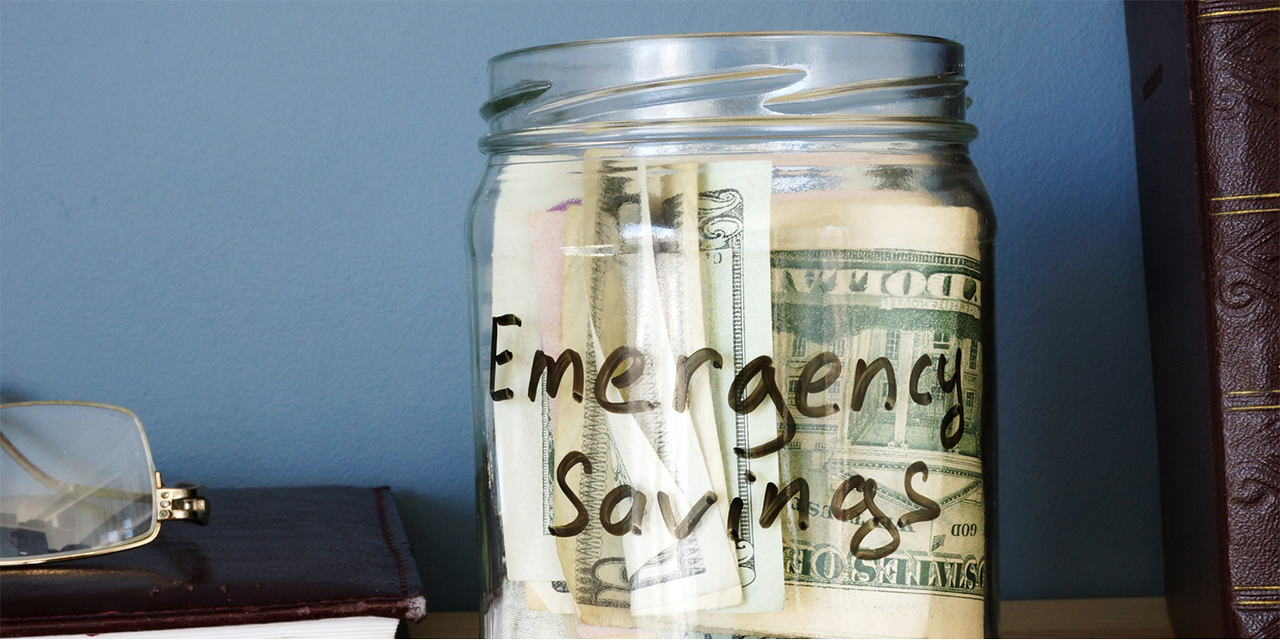
Building Your Emergency Fund
Emergencies, unfortunately, are a fact of life. Whether it’s a medical issue, an unforeseen car or home repair or even a sudden job loss, there may be times when we need ready access to cash – sometimes for a lengthy period of time. While creating an emergency fund can take time and effort, it can also provide two things often in short supply during an emergency: options and peace of mind.
What Is an Emergency Fund?
An emergency fund is what it sounds like – money you put away for the proverbial rainy day when you need quick access to cash. It’s different from a savings fund, where you might save for some future, large expense, like a down payment on a house. This fund is only to be used in a true emergency, in the event you suddenly find yourself unemployed or facing a financial crisis.
Isn’t That What Credit Cards Are For?
Credit cards offer a great deal of convenience, but at a cost. Credit card interest rates of 15–20% or more are common, which are significantly higher than most other forms of debt. Access to credit can be valuable in an emergency, but if not handled carefully, credit card debt can make a tenuous financial situation worse. Plus, you might not be able to pay some necessary monthly expenses, like rent or a mortgage, with credit.
If you do find yourself unable to pay off your full credit card bill at month’s end, you might want to look for a balance transfer opportunity, where you can move the debt to another card that offers you a lower introductory interest rate. This might give you some extra time to pay it off before interest starts to accrue. Just be aware that applying for more debt can have a negative impact on your credit score, which can affect your ability to borrow in the future.
How Much Should I Save?
While financial experts often recommend saving enough money to cover two to twelve months’ worth of expenses, that might be unrealistic for most people. We recommend you go through your monthly spending and look at which expenses are absolutely vital, such as food, shelter and transportation. Once you identify your necessities, then start building up your reserves to cover them.
Where Should I Save It?
In a financial emergency, the most important thing is accessibility: Your emergency fund needs to be liquid so you can access it at a moment’s notice without incurring penalties. Generally speaking, you may want to stay away from a stock-oriented investment, where you might be forced to liquidate during a downturn in the market. While it might not give you superior returns, that’s not the point of this account – it’s about keeping money safe and easy to access when you need it. For that reason, a money market or a short-term bond fund makes more sense. And if you’re in a higher tax bracket, think about a fund that invests in tax-exempt bonds – again, the earnings might not be significant, but you could gain some tax efficiencies.
If you’re a homeowner, another option to consider is a home equity line of credit, which can give you quick access to cash when you need it. If you choose this option, you would need to set up the line ahead of time, and you have to resist the temptation to access it for non-emergencies. Note that there might be a small annual fee to maintain the line.
Of course, the best way to deal with an emergency is to avoid one in the first place. Where you can, try to preempt the need to deplete your emergency fund by taking out adequate and comprehensive insurance policies and completing regular maintenance on hard-to-replace items like cars and furnaces. Your Baird Financial Advisor would be happy to help you put a thoughtful and comprehensive plan in place in case of emergencies.
Not a Baird client? Find a Financial Advisor.
The information offered is provided to you for informational purposes only. Robert W. Baird & Co. Incorporated is not a legal or tax services provider and you are strongly encouraged to seek the advice of the appropriate professional advisors before taking any action. The information reflected on this page are Baird expert opinions today and are subject to change. The information provided here has not taken into consideration the investment goals or needs of any specific investor and investors should not make any investment decisions based solely on this information. Past performance is not a guarantee of future results. All investments have some level of risk, and investors have different time horizons, goals and risk tolerances, so speak to your Baird Financial Advisor before taking action.


